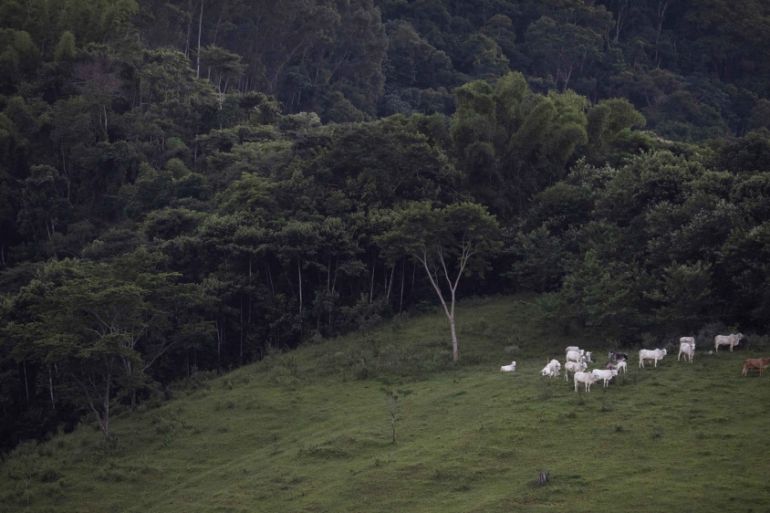Are financial giants contradicting their own climate pledges?
Report says corporate-level financing by five big firms contributes to oil drilling in the Amazon.

Five large financial firms from the United States and the United Kingdom are bankrolling an oil boom in the western Amazon, says a new report from environmental group Amazon Watch.
According to the data released this week, debt and equity financing from BlackRock, Citi, JPMorgan Chase, HSBC and Goldman Sachs are enabling the development of millions of hectares for oil extraction in Peru, Ecuador and Colombia.
Keep reading
list of 4 itemsScientists say Oman, UAE deluge ‘most likely’ linked to climate change
Photos: Deadly floods wreak havoc in Kenya’s capital
China evacuates over 100,000 as heavy rain continues to lash south
In many cases, these investments run contrary to recent climate pledges from those companies, says Amazon Watch, and could contribute to the environmental collapse of the Amazon region in South America.
Proposed oil drilling in isolated rainforest areas threatens the most biodiverse region in the world, endangers the way of life for indigenous communities and paves the way for more severe climate change.
“Oil drilling is happening in the Amazon, and that is something that not a lot of people know,” said Moira Birss, climate and finance director at Amazon Watch.
She told Al Jazeera that this development is “contributing to the climate crisis, deforesting the precious Amazon rainforest and violating indigenous territorial rights”.
“US and European investment banks are complicit in the environmental destruction,” she added. “All of the five financial institutions we call attention to in our report have recently made climate and sustainability commitments and announcements, but they fall far short of where they need to be.”
Scrutiny of big banks
Essential to mitigating climate change, the Amazon rainforest absorbs about two billion tonnes of carbon dioxide each year – some 5 percent of all global emissions.
As part of the Earth’s natural thermostat, hemispheric weather patterns and temperature regulation are significantly determined by Amazon’s state of equilibrium.
The ancestral indigenous lands of the western Amazon sit above oil and gas deposits, whose extraction causes climate woes and presents a financial risk for those firms funding the drilling.
The report from Amazon Watch details how, in the past three years, these five firms have provided tens of billions of dollars in debt and equity financing to four oil companies that operate in the Amazon: Amerisur, GeoPark, Frontera Energy and Andes Petroleum.
Asset Manager BlackRock received praise for a recent commitment to “fundamentally reshape finance to deal with climate change” as it pledged to reduce investments in coal companies and minimise agribusiness contributions to deforestation. But according to the report, BlackRock has $2.5bn worth of stocks and bonds in GeoPark, Frontera Energy and Andes Petroleum.
It also found that Citi contributed $827m in debt financing for the expansion of Amazon crude oil operations by those same three energy firms.
JPMorgan Chase recently imposed fresh restrictions on underwriting Arctic oil and gas. But Amazon Watch research revealed that – as of the end of 2019 – the company held $401m of stocks and bonds in Geopark, Frontera Energy and Andes Petroleum. It contributed an additional $490m in debt financing for crude operations in the Amazon.
HSBC held $595m of stocks and bonds in GeoPark and Andes Petroleum and over the last three years provided $648m in debt financing for oil activity in the Amazon. HSBC’s total contribution to Amazon crude extraction was $1.24bn.
Since 2017, Goldman Sachs has contributed $998m in debt financing for Andes Petroleum and GeoPark, and its holdings of stocks and bonds for the two companies brought total financing of Amazon crude to well above $1bn, the report found.
‘Corporate-level financing’
While many of these financial firms have expressed bold commitments towards environmental and social goals, Amazon Watch says they need to do much more to clean up their records.
Along with a coalition of other organisations, Amazon Watch is singling out these companies with a Stop the Money Pipeline campaign – demanding a significant shift in the financing of fossil fuel extraction and deforestation.
“The primary reason much of the western Amazon region remains largely free of industrial extraction,” the report said, “is due to the successful efforts of indigenous peoples to protect and defend their territories.”
“We initially had been focused on project-level financing: loans for a specific project,” said Birss of Amazon Watch.
“This missed the whole picture, because corporate-level financing allows an oil company to expand operations, particularly for some of the more controversial, risky or difficult projects,” she added.
“Fossil fuel stocks are in decline,” Birss said, referring to the recent oil plunge and lack of petroleum profitability over the long term. “But the explanation isn’t as simple as whether a [individual] stock is performing well.”